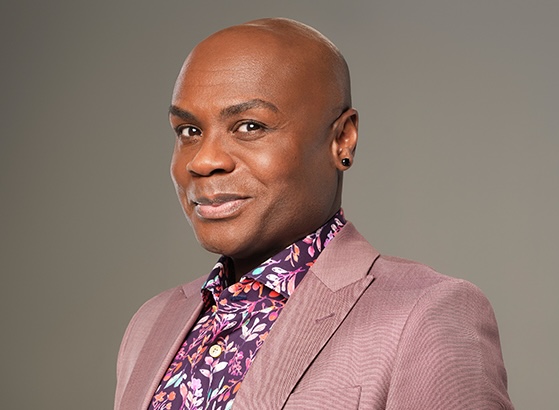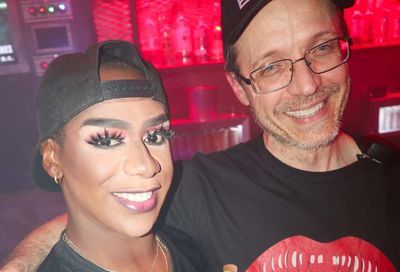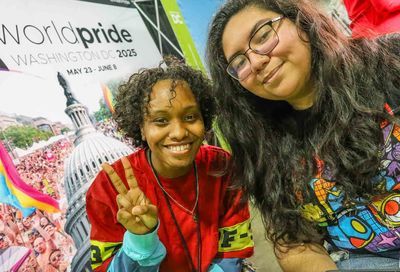Arc of Progress
A Town Square Opinion
I spent last Saturday in a video-watching marathon with Noah’s Arc, the black gay dramedy that ran for two seasons on the Logo channel. I don’t have Logo on my cable service, but I enjoyed the show’s pilot three years ago at D.C.’s Reel Affirmations film festival. When I stopped in Lambda Rising to pick up the newly released second-season set, the 20-something clerk said he didn’t watch much TV and never heard of either Noah’s Arc or Logo. Someone knows about them, since the DVDs keep selling out. My overseas boyfriend Patrick says the series is highly popular among his friends in Brussels.
Noah’s Arc centers on four black gay friends in West Hollywood: Noah the screenwriter, who can’t decide which gorgeous hunk to settle down with; Alex the matriarch figure and HIV/AIDS counselor; Chance the Ivy Leaguer adjusting to marriage and parenthood; and slutty clothing-store owner Ricky. The show is funny and sexy with a stylish look and feel. While the writing and acting have their detractors, the actors are attractive and make a pleasant ensemble. I guess that should be in the past tense, since Logo did not pick up the series for a third season.
The plot developments are sometimes predictable or implausible or both, and the deleted scenes included on the DVD (such as a sex scene in a beach bathroom) suggest that the backers wanted something a bit safer than creator Patrik-Ian Polk originally envisioned; but the overall result is a refreshing presentation of a range of black gay characters who make no apologies for being as they are and do not hide in the margins of the plot. The show explores contemporary issues without preachiness, and adds some brown sugar with guest appearances by talents like Rockmond Dunbar, Keith Hamilton Cobb and cute young rapper Raz B.
Discussion boards include plenty of skepticism concerning claims by most of the show’s actors that they are straight. The show itself deals with the trend of straight actors comfortably playing gay characters. Personally, if I had to choose between openly gay actors and openly gay producers and directors, I would pick the latter, because they select and shape what ends up on screen.
Just getting a gay-themed show produced and featured on a cable channel remains a significant achievement. As Jasmyne Cannick, a producer for the show’s first season, told AfterElton.com regarding the promised Noah’s Arc theatrical-release movie, ”If I … had a choice between an eight-episode season and an indie film, I’m going with the season. I want to be on television. I want to be able to be in these homes at 2, 3, 4 in the morning, 2 in the afternoon, whenever people want to watch me.”
As with any endeavor, indie film directors get better by doing. When Maurice Jamal’s first film, The Ski Trip, ran at Reel Affirmations in 2004, Metro Weekly reviewer Dan Odenwald called it ”a tedious and virtually joyless initial effort” and ”a hackneyed journey through the land of romantic comedy clichés.” Contrarily, blogger Keith Boykin wrote, ”What do you get when you mix a great story with complex characters, witty dialogue and realistic acting? You get Ski Trip….” I believe the evidence supports Odenwald, but Boykin can be forgiven, since he acknowledged that the movie’s star was his partner. Also, as Boykin notes, Ski Trip was ”the first black gay feature-length film on commercial television.”
Jamal has a typical indie filmmaker bio: Arriving broke in New York City, he proved himself through hard work and persistence and won a series of gigs including work on Chappelle’s Show. His latest effort, Dirty Laundry, is due for release this fall.
The popular response to artists like Polk and Jamal reflects a hunger for positive and self-created portrayals. Improving and keeping film-industry access for minority artists requires community support beyond the price of a ticket or a DVD. It is aided by exposure such as the film festival circuit provides.
The importance of independent filmmakers is underscored by the exploitation still evident in the choice of projects receiving more mainstream funding and wider release. For example, in theaters this fall, Vivica A. Fox, Patti LaBelle and Louis Gossett Jr. will star in Cover, a murder drama dealing with the ”down low.” Oh, here we go again. Notwithstanding the director’s protests that the film deals responsibly with its subject matter, it sounds like an update of the notorious 1980 film Cruising. As Alex of Noah’s Arc would say, ”Girl, please.”
Richard J. Rosendall is a writer and activist whose work has appeared on Salon.com and the Independent Gay Forum (www.indegayforum.org). He can be reached at rrosendall@starpower.net.
Support Metro Weekly’s Journalism
These are challenging times for news organizations. And yet it’s crucial we stay active and provide vital resources and information to both our local readers and the world. So won’t you please take a moment and consider supporting Metro Weekly with a membership? For as little as $5 a month, you can help ensure Metro Weekly magazine and MetroWeekly.com remain free, viable resources as we provide the best, most diverse, culturally-resonant LGBTQ coverage in both the D.C. region and around the world. Memberships come with exclusive perks and discounts, your own personal digital delivery of each week’s magazine (and an archive), access to our Member's Lounge when it launches this fall, and exclusive members-only items like Metro Weekly Membership Mugs and Tote Bags! Check out all our membership levels here and please join us today!




















